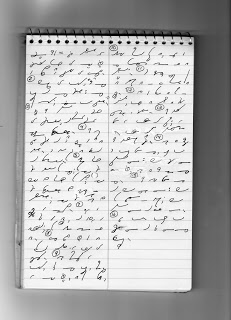Many people have found this Psalm to bring comfort, strength, and other types of help. This isn’t my best work–but it’s the best I could do tonight. I haven’t practiced enough lately, and I’m actually too exhausted to be writing good shorthand, but since I did it, I thought I’d share it. Perhaps someone here will benefit. It’s basically from the King James Version, but I changed ‘thou,’ ‘thee,’ ‘thy,’ and ‘thine’ to ‘you’ and ‘your;’ ‘shall’ is always ‘shall,’ never ‘shalt.’ Sometimes I change ‘that’ to ‘who.’ etc. King James punctuation is a different convention than 20th and 21st century. Sometimes I use punctuation from the New King James, but this time, I think I just mostly used old KJV punctuation.
Previous post: [ Proper Names and Common Christian Names ]
Next post: [ Pre-Anniversary help, please?? ]
Leave a Reply
You must be logged in to post a comment.

Which version of Gregg is this in?
Anniversary.
Thank you. This looks pretty well written and clear (or else I only think so because it's about what my hand would look like). The only unclear place for me was 'fowler', because it looked like f-a-th-l-r.
Thanks for pointing that out. In this day of technology, I could print out a page of 'fowl's from the Anni dictionary and trace until I get it right. That's about what it's going to take for me to do curved strokes after 'f-a' well. Although, now I'm looking at 'faithless' in the dictionary, which is spelled f-a-th-l, and the 'th' is turned the opposite way of normal. I wonder if that is to distinguish it from fowl–or it could be to ease the execution of the join between 'th' and 'l'
The f-a-u combination does seem like a tricky one. I've also found the word 'growl' to be oddly difficult.
Another way one could practice it is write several times the sequences f-u, f-e-u, f-a-u; f-u-l, f-e-u-l, f-a-u-l.
The th is turned the other way to follow the rule that the under th is used before o, r, and l to allow a sharp and distinct angle.
So then, I suppose that if 'fatherless' and 'faithless' needed to be positively distinguished, the 'r' could be added on to 'father.'
Starting with DJS, a distinction was made between faithless and fatherless by using the over th for fatherless. It's a confusing convention, because the base word has a different th than the derivatives!
Very nice. Thanks for posting!